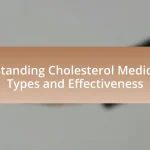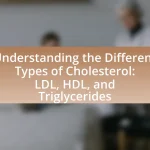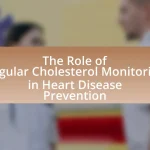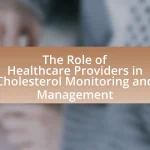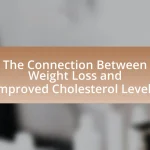The article focuses on the impact of lifestyle changes on the effectiveness of medication in cholesterol treatment. It highlights how adopting a heart-healthy diet, increasing physical activity, and quitting smoking can significantly improve lipid profiles, potentially reducing the need for cholesterol-lowering medications. Key findings include that lifestyle modifications can lower LDL cholesterol levels by 10-20% and enhance the efficacy of medications like statins. The article also discusses specific lifestyle changes, their interaction with medications, and the importance of understanding medication effectiveness in managing cholesterol levels. Additionally, it addresses practical strategies for implementing these changes and the resources available for patients seeking guidance.
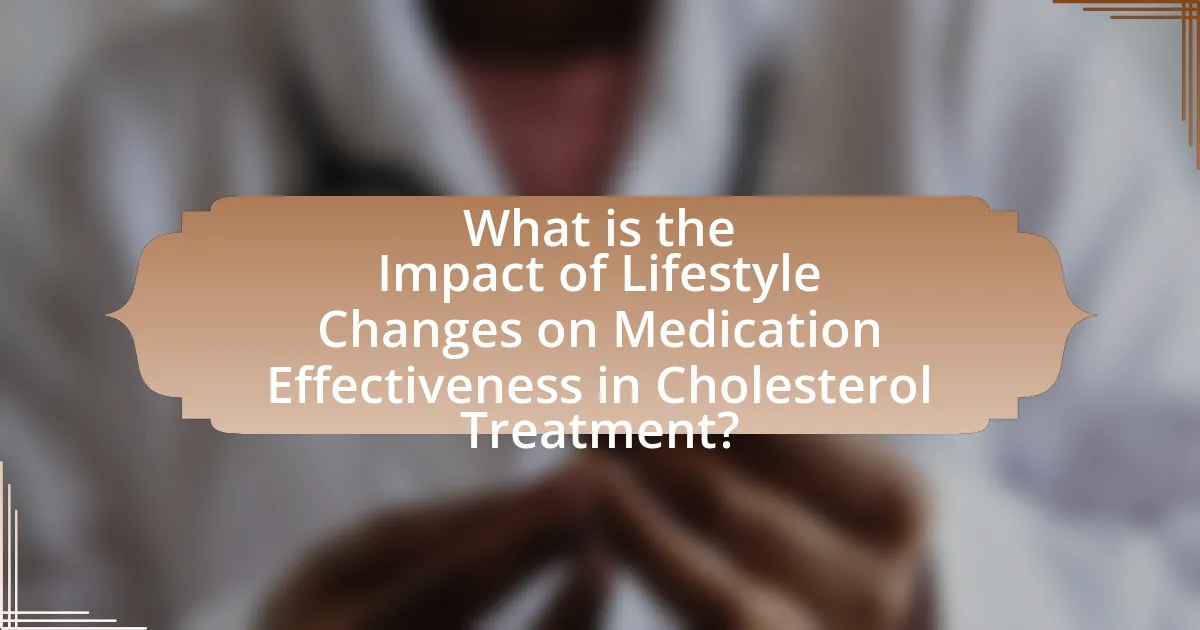
What is the Impact of Lifestyle Changes on Medication Effectiveness in Cholesterol Treatment?
Lifestyle changes significantly enhance the effectiveness of medication in cholesterol treatment. Studies indicate that adopting a heart-healthy diet, increasing physical activity, and quitting smoking can lead to improved lipid profiles, which may allow for lower doses of cholesterol-lowering medications or even reduce the need for them altogether. For instance, a meta-analysis published in the Journal of the American College of Cardiology found that lifestyle modifications can lower LDL cholesterol levels by 10-20%, thereby complementing the effects of statins and other medications. This synergy between lifestyle changes and pharmacotherapy underscores the importance of a holistic approach to managing cholesterol levels.
How do lifestyle changes influence cholesterol levels?
Lifestyle changes significantly influence cholesterol levels by improving lipid profiles and reducing cardiovascular risk. For instance, adopting a diet low in saturated fats and high in fiber can lower LDL cholesterol, while regular physical activity can raise HDL cholesterol. Research indicates that a Mediterranean diet, rich in healthy fats, can reduce total cholesterol levels by approximately 10-15%. Additionally, weight loss of just 5-10% can lead to a notable decrease in LDL cholesterol. These lifestyle modifications not only enhance the effectiveness of cholesterol-lowering medications but also contribute to overall heart health.
What specific lifestyle changes are most effective for lowering cholesterol?
The most effective lifestyle changes for lowering cholesterol include adopting a heart-healthy diet, increasing physical activity, maintaining a healthy weight, and quitting smoking. A heart-healthy diet emphasizes fruits, vegetables, whole grains, and healthy fats while reducing saturated and trans fats. Research indicates that diets rich in soluble fiber, such as oats and beans, can lower LDL cholesterol levels by up to 10%. Regular physical activity, such as 150 minutes of moderate exercise weekly, can raise HDL cholesterol and lower LDL cholesterol. Weight loss of 5-10% can significantly improve cholesterol levels, and quitting smoking can improve HDL cholesterol levels and overall heart health. These changes are supported by studies from the American Heart Association, which highlight their effectiveness in managing cholesterol levels and enhancing the efficacy of cholesterol-lowering medications.
How do these changes interact with cholesterol medications?
Lifestyle changes, such as diet and exercise, can significantly enhance the effectiveness of cholesterol medications. For instance, adopting a heart-healthy diet rich in fruits, vegetables, and whole grains can lower LDL cholesterol levels, thereby complementing the action of statins, which are commonly prescribed to reduce cholesterol. Research indicates that individuals who engage in regular physical activity can experience a 5-10% reduction in LDL cholesterol, which works synergistically with medications to improve overall lipid profiles. Additionally, weight loss from lifestyle modifications can further amplify the cholesterol-lowering effects of these drugs, leading to better cardiovascular outcomes.
Why is understanding medication effectiveness important in cholesterol treatment?
Understanding medication effectiveness is crucial in cholesterol treatment because it directly influences patient outcomes and guides clinical decision-making. Effective medications can significantly lower LDL cholesterol levels, reducing the risk of cardiovascular events. For instance, statins have been shown to reduce the risk of heart attacks by approximately 30% to 40% in high-risk populations, as evidenced by studies such as the JUPITER trial, which demonstrated that rosuvastatin reduced cardiovascular events in patients with elevated high-sensitivity C-reactive protein levels. By comprehensively understanding how different medications perform, healthcare providers can tailor treatment plans that incorporate lifestyle changes, optimizing overall cholesterol management and improving patient adherence to therapy.
What factors affect medication effectiveness in cholesterol management?
Medication effectiveness in cholesterol management is influenced by several key factors, including patient adherence to prescribed regimens, individual metabolic responses, drug interactions, and lifestyle choices. Adherence to medication is critical; studies show that non-adherence can lead to a 50% reduction in treatment effectiveness. Individual metabolic responses vary due to genetic factors, which can affect how a patient metabolizes cholesterol-lowering drugs, such as statins. Drug interactions with other medications can also diminish effectiveness; for instance, certain antibiotics can interfere with statin metabolism. Additionally, lifestyle choices, such as diet and exercise, significantly impact cholesterol levels and can enhance or diminish the effects of medication, as evidenced by research indicating that a heart-healthy diet can lower LDL cholesterol by 10-15%.
How can lifestyle changes enhance the effectiveness of cholesterol medications?
Lifestyle changes can significantly enhance the effectiveness of cholesterol medications by improving overall cardiovascular health and optimizing lipid profiles. For instance, adopting a heart-healthy diet rich in fruits, vegetables, whole grains, and healthy fats can lower LDL cholesterol levels and increase the efficacy of statins, a common class of cholesterol medications. Research published in the Journal of the American College of Cardiology indicates that patients who combined lifestyle modifications with medication experienced a 20-30% greater reduction in LDL cholesterol compared to those who relied solely on medication. Regular physical activity also contributes to this enhancement by increasing HDL cholesterol and reducing triglycerides, further supporting the action of cholesterol-lowering drugs. Therefore, integrating lifestyle changes with medication not only maximizes treatment outcomes but also promotes long-term heart health.

What are the key lifestyle changes that affect cholesterol treatment?
Key lifestyle changes that affect cholesterol treatment include adopting a heart-healthy diet, increasing physical activity, maintaining a healthy weight, quitting smoking, and moderating alcohol intake. A heart-healthy diet, rich in fruits, vegetables, whole grains, and healthy fats, can lower LDL cholesterol levels and improve overall heart health. Regular physical activity, such as 150 minutes of moderate exercise per week, can help raise HDL cholesterol and lower LDL cholesterol. Maintaining a healthy weight reduces the risk of high cholesterol and related cardiovascular diseases. Quitting smoking improves HDL cholesterol levels and overall cardiovascular health. Lastly, moderating alcohol intake can prevent increases in triglycerides, which are linked to heart disease. These lifestyle changes are supported by research from the American Heart Association, which emphasizes their role in enhancing the effectiveness of cholesterol-lowering medications.
How does diet impact cholesterol levels and medication effectiveness?
Diet significantly impacts cholesterol levels and the effectiveness of cholesterol medications. A diet high in saturated fats and trans fats can elevate LDL cholesterol, while a diet rich in fruits, vegetables, whole grains, and healthy fats can lower LDL cholesterol and raise HDL cholesterol. For instance, the American Heart Association recommends a diet low in saturated fat to improve lipid profiles, which can enhance the effectiveness of statins and other cholesterol-lowering medications. Studies have shown that individuals who adopt a heart-healthy diet alongside medication experience better outcomes, including lower cholesterol levels and reduced cardiovascular risk.
What dietary changes are recommended for cholesterol management?
To manage cholesterol effectively, individuals should adopt a diet low in saturated fats and trans fats while increasing their intake of soluble fiber and healthy fats. Reducing saturated fat intake, found in red meat and full-fat dairy products, can lower LDL cholesterol levels. Incorporating foods rich in soluble fiber, such as oats, beans, lentils, fruits, and vegetables, helps to reduce cholesterol absorption in the bloodstream. Additionally, consuming healthy fats from sources like olive oil, avocados, and fatty fish can improve overall cholesterol profiles by raising HDL cholesterol. Studies indicate that these dietary changes can significantly impact cholesterol levels, supporting the effectiveness of medication in cholesterol treatment.
How do specific foods interact with cholesterol medications?
Specific foods can significantly interact with cholesterol medications, affecting their efficacy and absorption. For instance, grapefruit and grapefruit juice are known to inhibit the enzyme CYP3A4, which is crucial for metabolizing certain statins, leading to increased drug levels and a higher risk of side effects. Additionally, high-fiber foods, such as oats and barley, can enhance the effectiveness of cholesterol-lowering medications by binding to bile acids and promoting their excretion, thereby reducing cholesterol levels. Studies have shown that incorporating these foods can optimize treatment outcomes, as evidenced by research published in the Journal of Clinical Lipidology, which highlights the importance of dietary considerations in managing cholesterol levels effectively.
What role does physical activity play in cholesterol treatment?
Physical activity plays a crucial role in cholesterol treatment by helping to lower LDL (low-density lipoprotein) cholesterol levels and raise HDL (high-density lipoprotein) cholesterol levels. Engaging in regular exercise can lead to significant improvements in lipid profiles; for instance, a study published in the Journal of the American College of Cardiology found that individuals who participated in moderate-intensity aerobic exercise experienced a reduction in LDL cholesterol by approximately 5-10% and an increase in HDL cholesterol by about 3-5%. This dual effect contributes to a lower risk of cardiovascular diseases, making physical activity an essential component of cholesterol management strategies.
How much exercise is needed to see an impact on cholesterol levels?
To see an impact on cholesterol levels, at least 150 minutes of moderate-intensity aerobic exercise per week is recommended. This amount of exercise has been shown to improve lipid profiles, including lowering LDL cholesterol and increasing HDL cholesterol. Research published in the Journal of the American College of Cardiology indicates that individuals who engage in regular physical activity within this guideline can experience significant improvements in their cholesterol levels, contributing to better cardiovascular health.
What types of physical activities are most beneficial for cholesterol management?
Aerobic exercises, such as brisk walking, running, cycling, and swimming, are most beneficial for cholesterol management. These activities help increase high-density lipoprotein (HDL) cholesterol, which is known as the “good” cholesterol, while also lowering low-density lipoprotein (LDL) cholesterol, the “bad” cholesterol. Research indicates that engaging in at least 150 minutes of moderate-intensity aerobic exercise per week can lead to significant improvements in cholesterol levels. For instance, a study published in the Journal of the American College of Cardiology found that individuals who participated in regular aerobic exercise experienced a 5% to 10% reduction in LDL cholesterol levels.
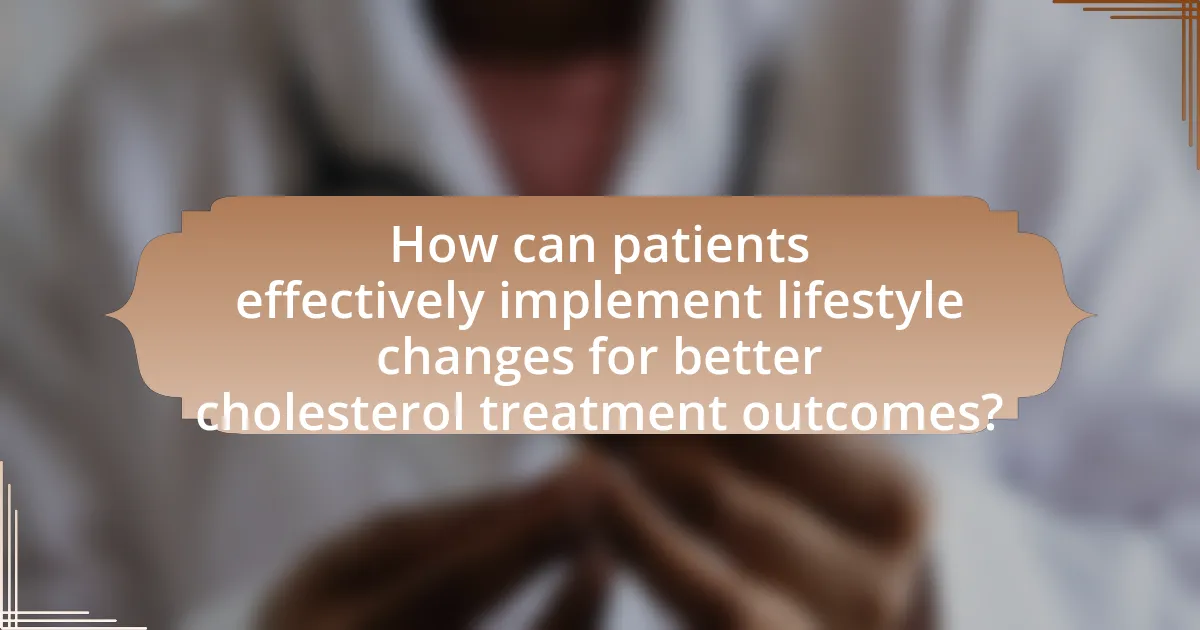
How can patients effectively implement lifestyle changes for better cholesterol treatment outcomes?
Patients can effectively implement lifestyle changes for better cholesterol treatment outcomes by adopting a heart-healthy diet, increasing physical activity, and managing stress. A heart-healthy diet includes reducing saturated fats and trans fats, increasing fiber intake, and consuming more fruits, vegetables, and whole grains. Research indicates that dietary changes can lower LDL cholesterol levels by 5-10% within a few weeks. Regular physical activity, such as 150 minutes of moderate exercise per week, can raise HDL cholesterol and lower LDL cholesterol, contributing to improved cardiovascular health. Additionally, stress management techniques, such as mindfulness and relaxation exercises, can positively influence cholesterol levels by reducing cortisol, which is linked to increased cholesterol production.
What strategies can help individuals adopt healthier lifestyles?
Individuals can adopt healthier lifestyles by implementing strategies such as regular physical activity, balanced nutrition, and stress management. Engaging in at least 150 minutes of moderate aerobic exercise weekly can significantly improve cardiovascular health and enhance the effectiveness of cholesterol medications. A diet rich in fruits, vegetables, whole grains, and healthy fats, while low in saturated fats and sugars, has been shown to lower LDL cholesterol levels and improve overall health. Additionally, practicing stress-reduction techniques like mindfulness or yoga can positively influence metabolic health and support medication efficacy. Research indicates that lifestyle modifications can lead to a 30-50% reduction in cardiovascular events, underscoring the importance of these strategies in conjunction with medical treatment.
How can support systems enhance adherence to lifestyle changes?
Support systems enhance adherence to lifestyle changes by providing emotional, informational, and practical support, which significantly increases the likelihood of sustained behavior modification. Research indicates that individuals who engage with support systems, such as family, friends, or structured groups, experience higher motivation and accountability, leading to improved adherence rates. For instance, a study published in the Journal of the American Heart Association found that patients with social support were 50% more likely to maintain dietary changes and exercise regimens necessary for effective cholesterol management. This evidence underscores the critical role of support systems in facilitating lifestyle changes that positively impact medication effectiveness in cholesterol treatment.
What are common challenges faced when making lifestyle changes?
Common challenges faced when making lifestyle changes include lack of motivation, difficulty in breaking old habits, and managing time effectively. Research indicates that approximately 70% of individuals struggle to maintain motivation when attempting to adopt healthier behaviors, which can hinder progress in lifestyle modifications. Additionally, the process of changing ingrained habits often requires significant effort and persistence, as studies show that it can take an average of 66 days to form a new habit. Time management also poses a challenge, as individuals may find it difficult to prioritize lifestyle changes amidst their daily responsibilities, leading to inconsistent efforts. These factors collectively contribute to the difficulties encountered in successfully implementing and sustaining lifestyle changes.
What practical tips can improve medication effectiveness alongside lifestyle changes?
To improve medication effectiveness alongside lifestyle changes in cholesterol treatment, individuals should adopt a heart-healthy diet, engage in regular physical activity, and maintain a healthy weight. A heart-healthy diet, rich in fruits, vegetables, whole grains, and healthy fats, can enhance the effects of cholesterol-lowering medications, as evidenced by studies showing that dietary changes can lead to significant reductions in LDL cholesterol levels. Regular physical activity, such as aerobic exercise, can further improve lipid profiles and increase the efficacy of medications. Additionally, maintaining a healthy weight can reduce the burden on the cardiovascular system and improve overall medication response, as obesity is linked to poorer outcomes in cholesterol management.
How can patients monitor their cholesterol levels effectively?
Patients can effectively monitor their cholesterol levels by regularly obtaining blood tests, specifically lipid panels, which measure total cholesterol, LDL, HDL, and triglycerides. These tests provide quantifiable data on cholesterol levels, allowing patients to track changes over time. The American Heart Association recommends that adults have their cholesterol checked every four to six years, but those with risk factors may need more frequent testing. Additionally, patients can use home cholesterol testing kits for preliminary assessments, although these should not replace professional medical evaluations. Regular monitoring helps patients and healthcare providers assess the effectiveness of lifestyle changes and medications in managing cholesterol levels.
What resources are available for patients seeking lifestyle change guidance?
Patients seeking lifestyle change guidance can access various resources, including healthcare professionals, online platforms, and community programs. Healthcare professionals, such as dietitians and physicians, provide personalized advice and support tailored to individual health needs. Online platforms, like the American Heart Association and the National Institutes of Health, offer educational materials, tools, and resources focused on diet, exercise, and overall wellness. Community programs, such as local health workshops and support groups, facilitate peer support and shared experiences, enhancing motivation and accountability. These resources collectively empower patients to make informed lifestyle changes that can improve medication effectiveness in cholesterol treatment.
